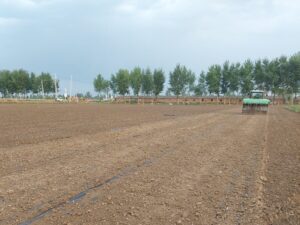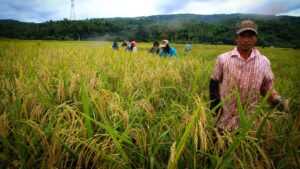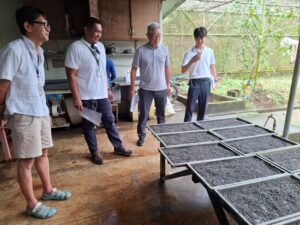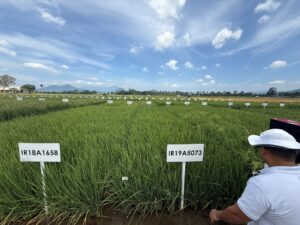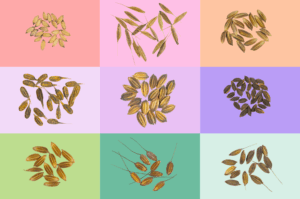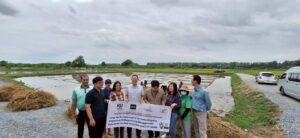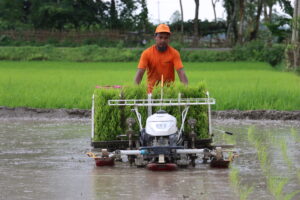
Rice was one of the cornerstones of the Asian Green Revolution. Will it play a similar role in sub-Saharan Africa (SSA)? Participants at the Africa Rice Congress in Dar es Salaam, Tanzania, on 31 July–4 August 2006, urged African governments to recognize the strategic role of rice and urgently put in place policies and infrastructure to transform the rice sector in the region.
The first of its kind in SSA, the Congress brought together more than 200 participants, including national and international rice scientists, policymakers, economists, international nongovernmental organizations, representatives from rice networks in West and East Africa, farmers’ associations, the private sector, the donor community, and media. The main purpose of the Congress was to chart the way forward for rice research and development in SSA.
Rice is of significant importance to food security in many African countries. Although per capita rice consumption in some Asian nations is declining, it is growing rapidly in most countries in SSA. Annual demand for rice in SSA is increasing by 6% per year, fueled by rapid population growth and changes in consumer preferences.
Although rice production in SSA rose from 6.2 million tons of paddy (unhulled) rice in 1980 to 12.6 million tons in 2005, it has not been able to keep pace with increasing demand. As a result, the quantity of rice imported yearly by the region increased from 2.5 million tons in 1980 to 7.2 million tons in 2005. Rice imports cover more than 45% of SSA’s consumption and represent a third of world rice imports.
Since only 4–6% of world rice output is subject to trade, Aliou Diagne, impact assessment economist from the Africa Rice Center (WARDA), cautioned that SSA would be ill advised to rely on this relatively “thin” world rice market for its growing rice demand. “SSA should urgently review its rice import policy to avoid a crisis in the near future,” he said at the Congress.
Dr. Diagne emphasized the need for African smallholder farmers to get a more level playing field to access markets, inputs, and credit. “While SSA’s 36 million farmers scrape a living out of rice farming in a liberalized market, Asian and American rice farmers are highly supported by their governments,” he said.
Confirming the vital need for government support to the rice sector, World Food Prize Laureate and former International Rice Research Institute (IRRI) principal breeder Gurdev Khush said that the development of highyielding varieties alone could not have provided the boost in rice production that led to India’s Green Revolution in the 1960s.
“It was a combination of success factors that included the government’s decision to support its rice farmers by providing a fertilizer subsidy, price support, and a ready market, in addition to irrigation, roads, and machinery,” said Dr. Khush.
The Congress participants acclaimed the achievements of WARDA’s partnership-based research, especially its New Rice for Africa (NERICA) varieties. “We are just witnessing the beginning of the NERICA revolution in Africa,” stated Keijiro Otsuka, chair of IRRI’s Board of Trustees. Discussions began on the development of next-generation NERICAs.
The need to strengthen the capacity of human resources of the whole range of rice stakeholders—from researchers to extension workers, farmers, and processors—was underscored.
A Committee of Eminent Persons comprising mainly the keynote speakers at the Congress provided overall guidance to the discussions on some of the critical issues relating to rice research and development in SSA.
The committee included Dr. Khush; Ruth Oniang’o, member of parliament, Kenya; Eric Tollens, Catholic University of Leuven, Belgium; Susan McCouch, Cornell University, USA; Marco Quinones, Africa director of Sasakawa-Global 2000; Toshiyuki Wakatsuki, Kinki University, Japan; Prof. Otsuka; Oumar Niangado, Syngenta Foundation, Mali; Mpoko Bokanga, African Agricultural Technology Foundation, Kenya; Kallunde Sibuga, Sokoine University, Tanzania; and Richard Musangi, Kenya.
The Congress was organized by WARDA, in association with the West and Central Africa Rice Research and Development Network and the East and Central Africa Rice Research Network, under the aegis of the Tanzanian Ministry of Agriculture, Food, and Cooperatives. Sponsors were the U.S. Agency for International Development, the Canadian Fund for Africa, the Sasakawa Africa Association, the West and Central African Council for Agricultural Research and Development, the Association for Strengthening Agricultural Research in Eastern and Central Africa, the European Union, and the Rockefeller Foundation.
The first Congressional Honor was bestowed on Kanayo F. Nwanze, in recognition of his outstanding contribution to rice research and development in Africa during his term as WARDA director general from 1996 to 2006.

